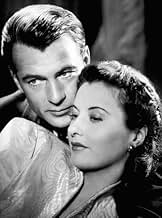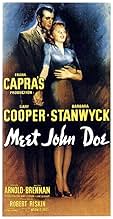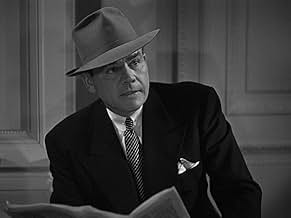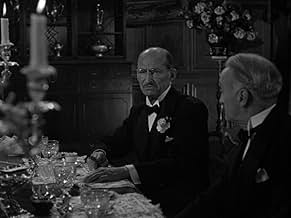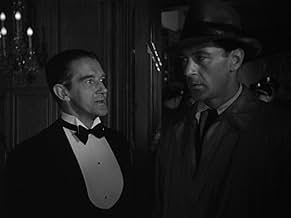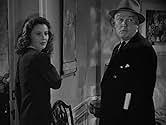VALUTAZIONE IMDb
7,6/10
15.892
LA TUA VALUTAZIONE
Aggiungi una trama nella tua linguaA penniless drifter is recruited by an ambitious columnist to impersonate a non-existent person who said he'd be committing suicide as a protest, and a social movement begins.A penniless drifter is recruited by an ambitious columnist to impersonate a non-existent person who said he'd be committing suicide as a protest, and a social movement begins.A penniless drifter is recruited by an ambitious columnist to impersonate a non-existent person who said he'd be committing suicide as a protest, and a social movement begins.
- Regia
- Sceneggiatura
- Star
- Candidato a 1 Oscar
- 4 vittorie e 1 candidatura in totale
Charles C. Wilson
- Charlie Dawson
- (as Charles Wilson)
Recensioni in evidenza
10B&W-2
This film offers a standing rebuke to critics who use the term "Capracorn". None of Capra's films are as blindly optimistic as is often argued, but this one is a pitch-black jeremiad against manipulation by the media. The mob scene at the "John Doe" convention is one of the powerful scenes ever filmed. Stanwyck is incredible as reporter Anne Mitchell. She is one of the great actresses of the century, and she always did her best work Capra, whose female characters are generally more compelling to the women we get in the movies of our "liberated" era. Cooper is fantastic as a truly "average" guy who is "awakened" by his experience with the John Doe movement, and Edward Arnold is absolutely terrifying in the role of Fascist D.B. Norton. This film is even more relevant today than when it was made, and I would argue that it should be viewed in high schools across the continent. Capra is asking his viewers to think critically of EVERYTHING they hear on the radio or see in papers or hear from elites, and amen to that!
About 15 or twenty years ago MEET JOHN DOE aired on a saturday matinee program on the CBC. I watched it and absolutely loved it. In the ensuing two decades I have Studied Film History and the art of film making. I have debated Film Theory and criticisum with some of the country's most film-smart people and have worked extensively in the film industry. And very rarely through all of this was Meet John Doe mentioned. The other day I saw A copy of the film in a used video store, remembered it from my youth and promptly bought it. And after viewing it again I have to say it is definetly one of the finest motion-pictures I have ever seen. It has to be one of the most under-rated movies ever made. The social commentary exhibeted is one of the boldest that the medium has ever presented, especially considering the time it was made. A time when media propaganda was a driving force for home-shore morale at the beginning of WWII. Capra and langs techniques in this work are absoloutly astounding. The riot scene should be looked upon as ground breaking. The performances (both the lead and supporting) are among some of the finest and most endearing of the time. Needless to say I'm going to be toot this films horn for quite some time. (I think I'll go watch it again.)
Frank Capra's unabashed patriotism wins another pennant for Team U.S.A. with `Meet John Doe,' an Oscar-nominated feature (for original screenplay) that roots for the underdog while demonstrating the power of the people en masse. He backs up his strong, daunting ideology with sharp, crisp writing and even sharper character delineation. Capra's social piece was timely released in 1940, when Nazi sympathizers were gaining a potent voice in America, just prior to our involvement in WWII.
Struggling columnist Ann Mitchell (the incomparable Barbara Stanwyck) is one of many about to receive their walking papers as the latest casualties of a newspaper takeover. Learning that her dismissal is in part due to a writing style that lacks bite, she vents her anger on her last assignment, fabricating and printing a somber, biting `John Doe' letter. `Written' by a despairing, unemployed man, who, tired of life's indignities, has given up on an indifferent, capitalistic society, the writer vows to throw himself off the top of City Hall on Christmas Eve.
Ann's last column sparks a major outpouring of varying concern, not only from top government officials, but from newspaper competitors who claims the piece is a work of fiction designed to promote sales subscriptions, and from the public who are genuinely moved by this man's plight. Caught between a rock and a hard place, the new editor-in-chief (James Gleason, in a marvelous turn) reluctantly keeps Ann on the payroll (with a bonus) while deciding to run with the story. Auditioning indigent men to lend a face to their `John Doe,' they find their man in 'Long John' Willoughby (played to perfection by Gary Cooper), an ex-baseball player who has fallen on hard times. Willoughby becomes an instant celebrity and an identifiable symbol of integrity and humanity. `John Doe' clubs soon start sprouting up all over the place promoting `good neighbor' policies. Trouble brews, however, when a ruthless financier (played with typical malice by Edward Arnold) agrees to sponsor `John Doe' appearances for radio and the lecture circuit, then threatens the movement by using it for his own political aspirations.
Cooper and Stanwyck are ideal in their top roles. Stanwyck is peerless when it comes to playing smart, gutsy gals. Here, she shows all sorts of vibrant colors as an assertive reporter trying desperately to climb up the newspaper ladder without getting her hands too dirty, trapped on both sides of the fence and playing both sides superbly. Coop too is deeply affecting, the epitome of the `aw shucks' kind of 'everyman' who manages to find a stirring, articulate voice underneath all that awkwardness and reticence. Nobody plays this kind of role better.
It helps too that the leads are surrounded by all-star character pros. James Gleason is marvelous as the frustrated editor who must wrestle with his conscience as the hoax he orchestrated gets seriously out of hand. He has one exquisitely tipsy scene in a bar with Coop where he lays all the cards out on the table. Regis Toomey, as a prime spokesperson for the "John Doe" movement, has a touching moment as he expresses the impact the club has made on his community. Edward Arnold is exemplary as the manipulating moneybags, and Walter Brennan's straightforward Colonel is insightful as Coop's obstinate buddy who sees his friend falling into the same opportunistic trappings he is supposedly rebelling against. The one veteran, scene-stealing player not up to snuff is Spring Byington, who is stuck on the bench in a rather benign, devoted mom role.
The only foul ball I found in this fast-paced, smooth-running story takes place atop the City Hall with an overly hysterical Stanwyck punching home Capra's idealism ad nauseum. It could have been more effective with a still strong but subtler set-up and approach. So, hey, it's not quite a shutout, but why quibble when the rest of the film is way ahead of the game.
Like the equally dark `It's a Wonderful Life,' Capra's genius is that he knows how to pitch and score the important points when necessary, not only with laughter and tears, but with unyielding hope and, most significantly, with words. It's more than any home crowd can ask for.
Struggling columnist Ann Mitchell (the incomparable Barbara Stanwyck) is one of many about to receive their walking papers as the latest casualties of a newspaper takeover. Learning that her dismissal is in part due to a writing style that lacks bite, she vents her anger on her last assignment, fabricating and printing a somber, biting `John Doe' letter. `Written' by a despairing, unemployed man, who, tired of life's indignities, has given up on an indifferent, capitalistic society, the writer vows to throw himself off the top of City Hall on Christmas Eve.
Ann's last column sparks a major outpouring of varying concern, not only from top government officials, but from newspaper competitors who claims the piece is a work of fiction designed to promote sales subscriptions, and from the public who are genuinely moved by this man's plight. Caught between a rock and a hard place, the new editor-in-chief (James Gleason, in a marvelous turn) reluctantly keeps Ann on the payroll (with a bonus) while deciding to run with the story. Auditioning indigent men to lend a face to their `John Doe,' they find their man in 'Long John' Willoughby (played to perfection by Gary Cooper), an ex-baseball player who has fallen on hard times. Willoughby becomes an instant celebrity and an identifiable symbol of integrity and humanity. `John Doe' clubs soon start sprouting up all over the place promoting `good neighbor' policies. Trouble brews, however, when a ruthless financier (played with typical malice by Edward Arnold) agrees to sponsor `John Doe' appearances for radio and the lecture circuit, then threatens the movement by using it for his own political aspirations.
Cooper and Stanwyck are ideal in their top roles. Stanwyck is peerless when it comes to playing smart, gutsy gals. Here, she shows all sorts of vibrant colors as an assertive reporter trying desperately to climb up the newspaper ladder without getting her hands too dirty, trapped on both sides of the fence and playing both sides superbly. Coop too is deeply affecting, the epitome of the `aw shucks' kind of 'everyman' who manages to find a stirring, articulate voice underneath all that awkwardness and reticence. Nobody plays this kind of role better.
It helps too that the leads are surrounded by all-star character pros. James Gleason is marvelous as the frustrated editor who must wrestle with his conscience as the hoax he orchestrated gets seriously out of hand. He has one exquisitely tipsy scene in a bar with Coop where he lays all the cards out on the table. Regis Toomey, as a prime spokesperson for the "John Doe" movement, has a touching moment as he expresses the impact the club has made on his community. Edward Arnold is exemplary as the manipulating moneybags, and Walter Brennan's straightforward Colonel is insightful as Coop's obstinate buddy who sees his friend falling into the same opportunistic trappings he is supposedly rebelling against. The one veteran, scene-stealing player not up to snuff is Spring Byington, who is stuck on the bench in a rather benign, devoted mom role.
The only foul ball I found in this fast-paced, smooth-running story takes place atop the City Hall with an overly hysterical Stanwyck punching home Capra's idealism ad nauseum. It could have been more effective with a still strong but subtler set-up and approach. So, hey, it's not quite a shutout, but why quibble when the rest of the film is way ahead of the game.
Like the equally dark `It's a Wonderful Life,' Capra's genius is that he knows how to pitch and score the important points when necessary, not only with laughter and tears, but with unyielding hope and, most significantly, with words. It's more than any home crowd can ask for.
Director Frank Capra lays it on pretty thick here, with a message combining the love of one's fellow man, the need to defend America's freedoms, and the power of common people to stand up to the rich and powerful when they band together and act out of decency and truth. This is a film filled with big idealistic speeches and moments meant to stir the heart. Capra knew that the democracy faced threats all over the globe as WWII loomed, but also that America, like any other country, faced threats within, that it was possible that an authoritarian may rise to power here by exploiting the masses, and controlling the media. This was a real possibility in the 1940's, and of course, is still relevant today.
It's very telling that at the beginning of the movie, a newspaper is being taken over by a rich industrialist, who wants to stimulate circulation at any cost. The plaque outside the building reading "A free press means free people" is chiseled away, and replaced with one reading "A streamlined newspaper for a streamlined age." When a plucky young reporter (Barbara Stanwyck) keeps her job only by writing a fake letter from a John Doe, we're at first led to believe that the deception is for the better, because she uses the resulting column to push altruistic messages extracted from her late father's old writing. She and the newspaper editor (James Gleason) hire a local vagrant (Gary Cooper) to play the part of John Doe, and the message expands and catches on, so much so that 'John Doe Clubs' are being formed all over the country.
The message they push is one against all sorts of ills: the collapse of decency, corruption in local politics, graft in state relief, and hospitals shutting their doors to the needy. The idea is that if people could live up to Christian ideals all year round, rather than just at Christmas-time, that if they could simply 'love thy neighbor' and exercise tolerance for one another, they would not only feel better about life, but it would solve some of society's problems. All seems well, but lurking is the rich industrialist (Edward Arnold) funding the whole thing, initially for what seems to be the common good, but sure enough, he has ulterior motives. Thus, love your fellow man, but beware those seeking to control you. And for all his optimism and faith in man, Capra knew that a mob whipped into a frenzy was dangerous, and there are some dark elements in the film.
Edward Arnold is brilliant as the industrialist, and Gleason is excellent as the editor. The two of them turn in great performances in their supporting roles, with Gleason's speech while drunk ("Yep, I'm a sucker for this country...") is one of the film's strongest. He extols the idea that the freedoms enjoyed in America to speak and live freely were important, and far preferable to the totalitarian governments at both ends of the political spectrum in the world (e.g. Fascist Germany and the Communist Soviet Union). If that sounds like a nationalistic message it is, but it was appropriate for the period, and more than balanced out by the socialist and anti-materialistic messages.
Barbara Stanwyck is a delight to watch as always, and 1941 was a fantastic here for her ('Ball of Fire', also with Cooper, and 'The Lady Eve' came out that year). She's a wee melodramatic in the film's final scene though. Gary Cooper is just average in playing the bumbling everyman, and not as strong as Jimmy Stewart in similar roles for Capra. He is awkward and wide-eyed too often, especially early in the film. On the other hand, he shows a little bit of a devilish side in his subconscious, describing a dream of spanking Stanwyck at length (a scene which is a little odd). His best exchange with Stanwyck occurs when he senses she's also corrupt, and asks her "Did you write this?", referring to his next speech, she confesses yes but "I had no idea what was going on", and he pushes past her, remarking "That's a swell bracelet you're wearing," noticing the expensive gift she's received. He then proceeds to stand up to a group of powerful men, speaking for the little guy ("I'm just a mug and I know it. But I'm beginning to understand a lot of things. Why your types are as old as history. If you can't lay your dirty fingers on a decent idea, and twist it and squeeze it and stuff it into your own pocket, you slap it down! Like dogs! If you can't eat something you bury it!")
If it's not already apparent, if you're cynical by nature, this is probably not the film for you. And, I have to say, Capra uses just a teensy bit too much of a heavy hand here, among other things likening John Doe to Jesus Christ (you know, that other great socialist who preached love and tolerance). However, he also has brilliant moments when he lets everything linger, such as when the crowd is disillusioned and wonders who is telling them the truth. That moment is simply spellbinding. Solid film, with wonderful messages.
It's very telling that at the beginning of the movie, a newspaper is being taken over by a rich industrialist, who wants to stimulate circulation at any cost. The plaque outside the building reading "A free press means free people" is chiseled away, and replaced with one reading "A streamlined newspaper for a streamlined age." When a plucky young reporter (Barbara Stanwyck) keeps her job only by writing a fake letter from a John Doe, we're at first led to believe that the deception is for the better, because she uses the resulting column to push altruistic messages extracted from her late father's old writing. She and the newspaper editor (James Gleason) hire a local vagrant (Gary Cooper) to play the part of John Doe, and the message expands and catches on, so much so that 'John Doe Clubs' are being formed all over the country.
The message they push is one against all sorts of ills: the collapse of decency, corruption in local politics, graft in state relief, and hospitals shutting their doors to the needy. The idea is that if people could live up to Christian ideals all year round, rather than just at Christmas-time, that if they could simply 'love thy neighbor' and exercise tolerance for one another, they would not only feel better about life, but it would solve some of society's problems. All seems well, but lurking is the rich industrialist (Edward Arnold) funding the whole thing, initially for what seems to be the common good, but sure enough, he has ulterior motives. Thus, love your fellow man, but beware those seeking to control you. And for all his optimism and faith in man, Capra knew that a mob whipped into a frenzy was dangerous, and there are some dark elements in the film.
Edward Arnold is brilliant as the industrialist, and Gleason is excellent as the editor. The two of them turn in great performances in their supporting roles, with Gleason's speech while drunk ("Yep, I'm a sucker for this country...") is one of the film's strongest. He extols the idea that the freedoms enjoyed in America to speak and live freely were important, and far preferable to the totalitarian governments at both ends of the political spectrum in the world (e.g. Fascist Germany and the Communist Soviet Union). If that sounds like a nationalistic message it is, but it was appropriate for the period, and more than balanced out by the socialist and anti-materialistic messages.
Barbara Stanwyck is a delight to watch as always, and 1941 was a fantastic here for her ('Ball of Fire', also with Cooper, and 'The Lady Eve' came out that year). She's a wee melodramatic in the film's final scene though. Gary Cooper is just average in playing the bumbling everyman, and not as strong as Jimmy Stewart in similar roles for Capra. He is awkward and wide-eyed too often, especially early in the film. On the other hand, he shows a little bit of a devilish side in his subconscious, describing a dream of spanking Stanwyck at length (a scene which is a little odd). His best exchange with Stanwyck occurs when he senses she's also corrupt, and asks her "Did you write this?", referring to his next speech, she confesses yes but "I had no idea what was going on", and he pushes past her, remarking "That's a swell bracelet you're wearing," noticing the expensive gift she's received. He then proceeds to stand up to a group of powerful men, speaking for the little guy ("I'm just a mug and I know it. But I'm beginning to understand a lot of things. Why your types are as old as history. If you can't lay your dirty fingers on a decent idea, and twist it and squeeze it and stuff it into your own pocket, you slap it down! Like dogs! If you can't eat something you bury it!")
If it's not already apparent, if you're cynical by nature, this is probably not the film for you. And, I have to say, Capra uses just a teensy bit too much of a heavy hand here, among other things likening John Doe to Jesus Christ (you know, that other great socialist who preached love and tolerance). However, he also has brilliant moments when he lets everything linger, such as when the crowd is disillusioned and wonders who is telling them the truth. That moment is simply spellbinding. Solid film, with wonderful messages.
There's an Italianate "cinema verite" in Capra's work, perhaps genetic . . . I find this film so powerful, and its characters so sympathetic, that I can hardly watch the riot scene. It's almost too terrifying.
Cooper's performance at first seems wooden, but he's an actor whom you need to watch, like a pond, to see the emotions swimming beneath the surface. Barbara Stanwyck is one of my favorite actresses--she never makes a false move and is beautiful to watch from any angle.
I find some lines of dialogue chilling in this age of Patriot Acts I and II and corporate globalism/global corporatism: "The American people need an iron hand," declares D. B. Norton, whose sneer looks like Cheney's.
Cooper's performance at first seems wooden, but he's an actor whom you need to watch, like a pond, to see the emotions swimming beneath the surface. Barbara Stanwyck is one of my favorite actresses--she never makes a false move and is beautiful to watch from any angle.
I find some lines of dialogue chilling in this age of Patriot Acts I and II and corporate globalism/global corporatism: "The American people need an iron hand," declares D. B. Norton, whose sneer looks like Cheney's.
Lo sapevi?
- QuizDirector Frank Capra didn't want anyone to play John Doe except Gary Cooper, who agreed to the part without reading a script for two reasons: he had enjoyed working with Capra on È arrivata la felicità (1936), and he wanted to work with Barbara Stanwyck.
- BlooperAfter "John Doe" intrudes on D. B. Norton's dinner party and tells him off, Norton calls his newspaper and orders a special edition which will reveal Doe as a fraud. Doe takes a cab from Norton's house directly to the convention hall. Within minutes of his arrival there, a horde of newsboys appear with copies of the newspaper. It would be impossible to print an extra edition in such a short period of time. Correction: There isn't a plot hole, because D.B. Norton isn't saying nor implying that the newspaper will be printed from them on. He stated, before Ann is running after John Doe's in the Rain, "that he was prepared for this" and this does imply that the papers were already prepared, printed before. D.B. was a very rich man, callous, evil man. He foresaw all the problems in his investments.
- Versioni alternativeAlso available in a computer-colorized version.
- ConnessioniFeatured in The 54th Annual Academy Awards (1982)
- Colonne sonoreTHE BATTLE HYMN OF THE REPUBLIC
(1861) (uncredited)
Music by William Steffe
Lyrics by Julia Ward Howe
Performed by Hall Johnson Choir
I più visti
Accedi per valutare e creare un elenco di titoli salvati per ottenere consigli personalizzati
- How long is Meet John Doe?Powered by Alexa
Dettagli
- Data di uscita
- Paese di origine
- Lingua
- Celebre anche come
- I dominatori della metropoli
- Luoghi delle riprese
- Azienda produttrice
- Vedi altri crediti dell’azienda su IMDbPro
- Tempo di esecuzione
- 2h 15min(135 min)
- Colore
- Proporzioni
- 1.37 : 1
Contribuisci a questa pagina
Suggerisci una modifica o aggiungi i contenuti mancanti


